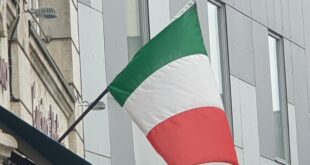Several thousands of protesters turned out in Dessau on Sunday to demand justice for Oury Jalloh who died in mysterious circumstances in police custody in the eastern German city 13 years ago.
Oury Jalloh died in a police cell in Dessau, Saxony-Anhalt, thirteen years ago, but the circumstances surrounding his death remain unclear until today.
More than four thousand supporters took to the streets of the eastern German city on Sunday for the annual march called by the Initiative in Memory of Oury Jalloh (Initiative zum Gedenken an Oury Jalloh).
Participants, many of whom had travelled from all parts of Germany and Europe, marched through the city waving flags and banners, chanting among others, “Oury Jalloh, it was murder”.
https://www.facebook.com/1499185663650104/videos/2113267162241948/
The then 36-year-old asylum seeker from Sierra Leone died on 7 January 2005 during a fire incident in a Dessau police cell. He had been detained to clarify his identity after he was arrested ostensibly for disturbing some women whose phone he had asked to use to make an urgent call.
Because he fiercely resisted, the police claim, his hands and feet were tied to a fireproof mattress on which he was laid. How the fire that burned the African to death came about remains unexplained even after two court cases.

The police claim that Oury Jalloh set the fire himself with a lighter, which was found only after three days after his death. Jalloh’s family and friends, represented by the Initiative in Memory of Oury Jalloh, and the black community believe he was murdered.
The circumstances of Oury Jalloh’s death have been subject to several investigations. The official accounts have been refuted by multiple independent arson investigations paid for by the Initiative in Memory of Oury Jalloh. Investigators concluded that Jalloh must have been unconscious or was already dead at the time the fire in the cell broke out.

Further results indicated that a fire accelerant had been used on Jalloh, which explained why he was burnt beyond recognition. As a result of enormous public pressure the prosecution office ordered another arson investigation which came to the same conclusions. Perhaps most significantly, Folker Bittmann, a state prosecutor who for many years defended the police’s account of Jalloh’s death, changed his mind in April, when he argued that a murder investigation should be opened.
Federal prosecutors declined to open a new investigation and referred the case back to state prosecutors in Halle, who declared the case closed on 12 October on the grounds that there was “not sufficient real evidence for the participation of a third party in the fire.”
“In the face of the new insights, the threatened closure of the investigation is a scandal,” Gabriele Heinecke, the lawyer representing the Jalloh family, said.

The Prosecutor General’s Office in Naumburg is now responsible for the preliminary proceedings in the case.
The state’s Justice Minister, Anne-Marie Keding, transferred the case to Naumburg last Thursday. Because of the different assessments of the case by the two prosecutors in Dessau-Roßlau and Halle, the superior authority should now handle the case.
The parliamentary group of the Left party in Saxony-Anhalt’s Landtag is calling for a committee of inquiry into the case. The law-makers say the state parliament had been wrongly informed about the investigations of the case several times.
The Left party accuse the state government — a coalition of the Christian Democrats, Social Democrats, and Greens — of a “political blockade.”
The Initiative in Memory of Oury Jalloh Jalloh in November 2017 initiated a petition, which has been signed by more than 100,000 persons, for a new trial.
Sola Jolaoso
 THE AFRICAN COURIER. Reporting Africa and its Diaspora! The African Courier is an international magazine published in Germany to report on Africa and the Diaspora African experience. The first issue of the bimonthly magazine appeared on the newsstands on 15 February 1998. The African Courier is a communication forum for European-African political, economic and cultural exchanges, and a voice for Africa in Europe.
THE AFRICAN COURIER. Reporting Africa and its Diaspora! The African Courier is an international magazine published in Germany to report on Africa and the Diaspora African experience. The first issue of the bimonthly magazine appeared on the newsstands on 15 February 1998. The African Courier is a communication forum for European-African political, economic and cultural exchanges, and a voice for Africa in Europe.
































